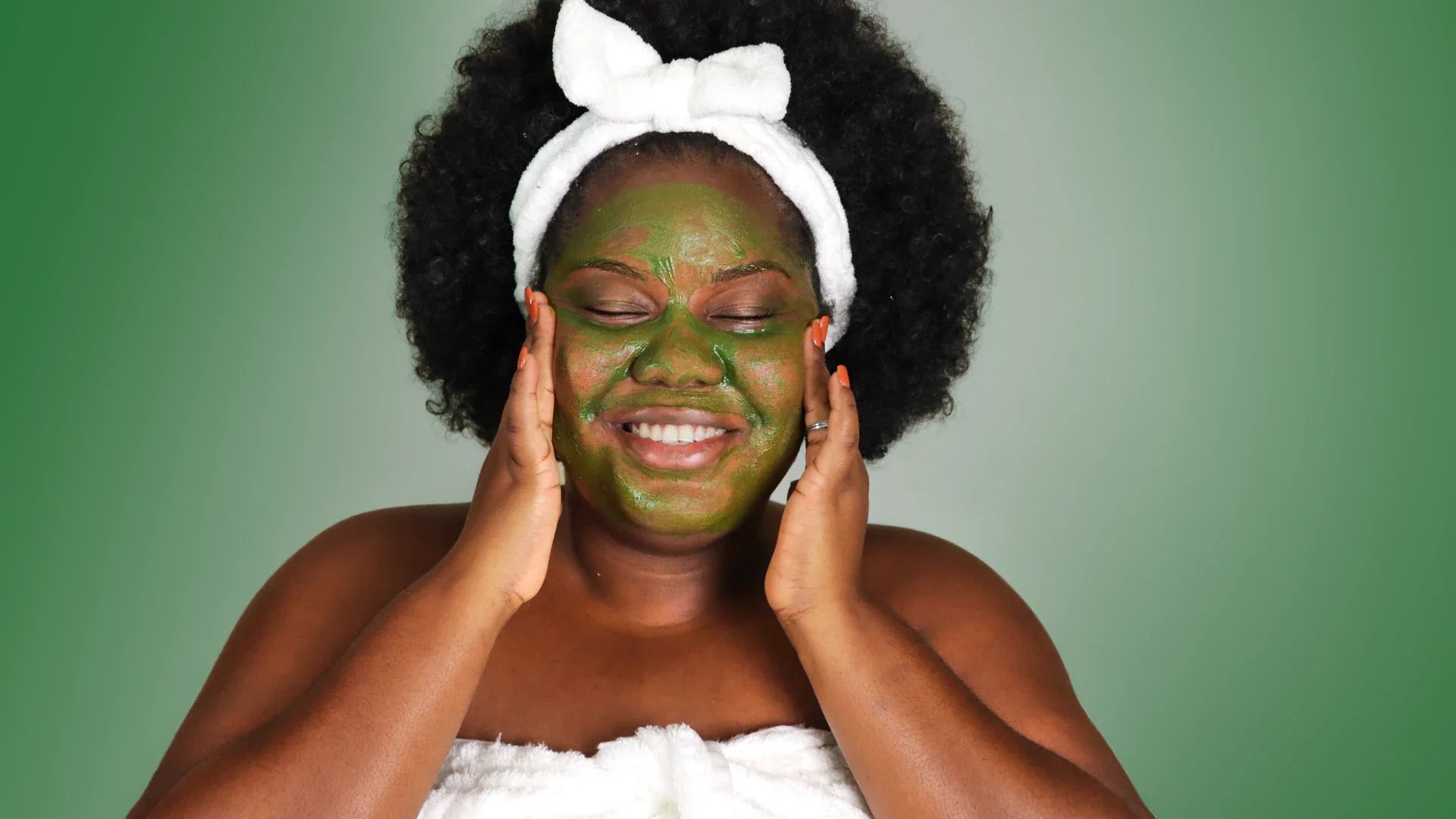Lorem ipsum is simply dummy of the printing and industry lorem text ipsum has been standard.
Acne, a common skin condition that affects millions worldwide (according to studies, 85% of people at some point in their lives), is a daily battle that can deeply impact self-esteem and confidence. You wake up in the morning, look in the mirror, and discover a new cluster of red, inflamed bumps on your face. We’ve all been there! Even though pimples are more complicated than once thought, we needn't just suffer through the red blotches and hope they eventually disappear.
Instead of relying on harsh chemicals, natural remedies use ingredients from nature, like plants and oils, to help clear up our skin. They're gentle and safer for our skin, especially if it's sensitive or prone to irritation. So, if you're looking for a more gentle way to treat your acne, natural remedies might be the answer. In this blog post, we're going to learn about 4 natural ways to get rid of acne fast. Keep reading to learn how natural remedies can help you achieve the clear skin you've been dreaming of.

What is Acne? What Causes These Bumps?
Acne is a common skin condition that affects millions of people worldwide, especially during adolescence and early adulthood. A common cause of acne is the clogging of pores by dead skin cells and oil (called sebum) from nearby glands. These clogged pores can also turn into whiteheads (clogged closed pores), and blackheads (clogged open pores), or worse like hard and painful cysts. These blemishes typically appear on the face, neck, chest, back, and shoulders, areas where the skin has a high density of oil glands.
There are several factors that cause the development of acne:
- Excess Oil Production: Our skin naturally produces oil (sebum) to keep it moisturized. However, excess oil production, often triggered by hormonal changes during the winter season (when our skin is more dry), puberty, or menstrual cycles, can clog pores and lead to acne.
- Clogged Pores: When the skin's pores become clogged with dead skin cells, oil, and bacteria, it creates an environment conducive to acne formation. This can result in the formation of comedones, including whiteheads (closed comedones) and blackheads (open comedones).
- Bacteria: Propionibacterium acnes (P. acnes) is a type of bacteria that lives on the skin and can contribute to the development of acne. When pores become clogged, P. acnes multiply within the follicle, triggering inflammation and the formation of pimples.
- Hormonal Changes: Fluctuations in hormone levels, such as those that occur during puberty, menstruation, pregnancy, or when taking certain medications, can increase oil production and contribute to acne flare-ups.
- Genetics: There's a genetic component to acne, meaning it can run in families. If your parents or siblings have struggled with acne, you may be more prone to developing it as well.
- Diet and Food: While the relationship between diet and acne is still debated among experts, some studies suggest that certain foods, particularly those high in refined sugars and carbohydrates, may exacerbate acne in some individuals.
- Skincare Habits: Using harsh skincare products, overwashing the skin, or failing to remove makeup thoroughly can irritate the skin and contribute to acne flare-ups.

Benefits of Natural Remedies
Natural remedies have gained popularity as preferred options for many individuals seeking to address their acne concerns. These remedies typically utilize ingredients derived from plants, herbs, and essential oils, which are generally gentler on the skin compared to harsh chemicals found in many conventional acne treatments. This gentle approach is particularly beneficial for individuals with sensitive skin, as it reduces the risk of irritation and inflammation.
Conventional acne treatments often contain synthetic chemicals such as benzoyl peroxide, salicylic acid, and retinoids, which can cause dryness, redness, and peeling, especially with prolonged use. On the other hand, natural remedies rely on the inherent properties of botanical extracts and essential oils to address acne without the need for harsh chemicals. This can result in a milder, more soothing experience for the skin.
4 Natural Ways to Get Rid of Acne Fast
1. Tea Tree Oil
Extracted from the leaves of Melaleuca alternifolia tree (native to Australia), the Tea tree oil is a popular natural remedy for acne due to its potent antibacterial and anti-inflammatory properties. A study discovered that using a gel with 5% tea tree oil was about four times better at reducing acne pimples and almost six times better at lessening how bad the acne looked compared to using nothing. (Study Source)
- Antibacterial Properties: Tea tree oil contains compounds such as terpinen-4-ol that have been shown to effectively kill acne-causing bacteria, including Propionibacterium acnes (P. acnes). By targeting these bacteria, tea tree oil helps reduce inflammation and prevent new breakouts from forming.
- Anti-Inflammatory Properties: In addition to its antibacterial effects, tea tree oil also exhibits anti-inflammatory properties, which can help soothe redness, swelling, and irritation associated with acne. This makes it particularly beneficial for individuals with inflammatory acne, characterized by painful, swollen breakouts.
How to Use Tea Tree Oil for Acne Treatment
- Dilute the Tea Tree Oil: Tea tree oil is highly concentrated and can cause irritation if applied directly to the skin. To avoid this, dilute the tea tree oil with a carrier oil, such as coconut oil or jojoba oil, before applying it to the skin. A general guideline is to mix one part tea tree oil with nine parts carrier oil.
- Spot Treatment: Using a clean cotton swab or cotton ball, apply the diluted tea tree oil directly to the affected areas of the skin. Focus on areas with active breakouts or areas prone to acne, such as the forehead, nose, and chin.
- Leave-on Treatment: Allow the tea tree oil mixture to remain on the skin for several hours or overnight to maximize its effectiveness. Avoid rinsing it off immediately to ensure prolonged contact with the skin.
- Repeat as Needed: You can use tea tree oil as a spot treatment once or twice daily, depending on the severity of your acne. However, if you experience any irritation or discomfort, reduce the frequency of application or discontinue use altogether.
Precautions and Potential Side Effects
Some individuals may be sensitive to tea tree oil and may experience irritation, redness, or allergic reactions upon application. It's essential to perform a patch test before using tea tree oil extensively and discontinue use if any adverse reactions occur.
Note: Tea tree oil should not be applied near the eyes or mucous membranes, as it can cause irritation and discomfort. Pregnant or breastfeeding individuals should consult with a healthcare professional before using tea tree oil, as its safety during pregnancy and breastfeeding has not been extensively studied.
2. Honey and Cinnamon Mask
Honey is known for its antimicrobial and wound healing properties and is used in clinical settings to treat wound infections. Numerous laboratory studies have shown that honeys from different regions have strong antimicrobial properties against bacteria relevant to skin health. Source
Honey and cinnamon are two natural ingredients renowned for their antimicrobial and anti-inflammatory properties. They make an effective combination for treating acne.
Both honey and cinnamon possess natural antimicrobial properties, meaning they can help inhibit the growth of acne-causing bacteria on the skin. They also exhibit anti-inflammatory properties, which can help reduce redness, swelling, and irritation associated with acne. This soothing effect can provide relief to inflamed skin and promote faster healing of acne lesions.
Recipe for Homemade Honey and Cinnamon Mask:
Ingredients:
- 1 tablespoon of raw honey
- 1/2 teaspoon of ground cinnamon
Follow These Steps:
- In a small bowl, combine the raw honey and ground cinnamon until well mixed. Adjust the quantities as needed to achieve a smooth, spreadable consistency.
- Cleanse your face thoroughly with a gentle cleanser to remove any dirt, oil, or makeup.
- Pat your skin dry with a clean towel, leaving it slightly damp to help the mask adhere better.
- Using clean fingertips or a clean brush, apply the honey and cinnamon mixture evenly to your face, focusing on areas prone to acne or active breakouts.
- Gently massage the mask into your skin using circular motions, ensuring that it covers the entire face.
- Allow the mask to sit on your skin for 10-15 minutes to allow the ingredients to work their magic.
- After the designated time has elapsed, rinse the mask off thoroughly with lukewarm water and pat your skin dry with a clean towel.
- Follow up with your regular skincare routine, such as applying moisturizer or acne treatment products, as needed.
Tips on Application and Frequency:
- Patch Test: Before applying the honey and cinnamon mask to your entire face, perform a patch test on a small area of skin to ensure that you don't have any adverse reactions or allergies to the ingredients.
- Apply to Clean Skin: For best results, apply the mask to clean, freshly washed skin to maximize absorption and effectiveness.
- Avoid Eye Area: Be careful to avoid the delicate skin around the eyes when applying the mask, as cinnamon can be irritating to sensitive areas.
- Frequency: You can use the honey and cinnamon mask 2-3 times per week, depending on your skin's tolerance and the severity of your acne. Adjust the frequency as needed to avoid over-drying or irritating the skin.
3. Aloe Vera
Aloe vera is a versatile plant known for its soothing and healing properties. It is an excellent natural remedy for acne-prone skin as it contains several compounds like lupeol, salicylic acid, urea nitrogen, cinnamonic acid, phenols, and sulfur, which can help prevent the growth of bacteria that cause acne.
In a study, researchers mixed different amounts of aloe vera gel into a clove-basil oil and tested its ability to fight acne. They found that the higher the concentration of aloe vera in the mixture, the better it worked at reducing pimples. Source
Another study discovered that combining 50% aloe vera gel with tretinoin cream was more effective at treating pimples compared to using tretinoin cream alone. Tretinoin cream is a medication for acne made from vitamin A. Source
- Soothing Properties: Aloe vera gel contains compounds such as polysaccharides and glycoproteins, which have anti-inflammatory properties that can help calm irritated and inflamed skin. This soothing effect can provide relief to acne-prone skin, reducing redness and discomfort associated with breakouts.
- Healing Properties: Aloe vera is also known for its ability to promote skin healing and regeneration. It contains enzymes, vitamins, and minerals that support the skin's natural repair processes, helping to speed up the healing of acne lesions and prevent scarring.
How to Apply Aloe Vera Gel to Acne-Prone Skin:
- Choose a High-Quality Aloe Vera Gel: Look for pure, organic aloe vera gel without added fragrances or alcohol, as these additives can irritate the skin and negate the benefits of aloe vera.
- Cleanse Your Skin: Start by cleansing your face with a gentle cleanser to remove any dirt, oil, or makeup from the surface of the skin. Pat your skin dry with a clean towel.
- Apply Aloe Vera Gel: Scoop out a small amount of aloe vera gel onto your fingertips and gently apply it to the affected areas of your skin. You can also apply it to your entire face if desired, as aloe vera is suitable for all skin types.
- Massage Gently: Using gentle, circular motions, massage the aloe vera gel into your skin until it is fully absorbed. Take care not to rub too vigorously, especially if you have active breakouts, as this can further irritate the skin.
- Leave On: Allow the aloe vera gel to dry completely on your skin before applying any additional skincare products or makeup. You can leave it on overnight for maximum benefit, or use it as a spot treatment during the day.
Other Benefits of Aloe Vera for Skincare:
- Moisturizing: Aloe vera gel has hydrating properties that can help moisturize the skin without clogging pores. It is suitable for all skin types, including oily and acne-prone skin.
- Antioxidant Protection: Aloe vera contains antioxidants such as vitamins C and E, which help protect the skin from free radical damage and environmental stressors that can contribute to acne and premature aging.
- Gentle Exfoliation: Aloe vera contains natural enzymes that gently exfoliate the skin and remove dead skin cells to prevent breakouts and promote a clearer complexion over time.
4. Using Green Tea for Acne
We drink green tea for its numerous health benefits, but applying it directly to the skin can be helpful to get rid of acne. Green tea contains compounds like flavonoids and tannins that fight inflammation and bacteria that cause pimples. It's also rich in an antioxidant called epigallocatechin-3-gallate (EGCG), which reduces inflammation, decreases oil production, and stops the growth of acne-causing bacteria.
Studies have shown that applying a 2 to 3% green tea extract to the skin can significantly reduce oil production and pimples in people with acne. (Source)
You can easily make your own green tea mixture at home:
- Steep green tea for around three minutes and let it cool down.
- Apply it to your face using a cotton ball or spray bottle.
- Leave it on for a few minutes or overnight, then rinse your face with water.
- Use it daily as needed. You can store it in the refrigerator for up to 2 weeks.
Conclusion
Dealing with acne can feel like a real challenge, but with natural remedies, you have gentle and effective ways to tackle it. Throughout this article, we've explored four natural methods to help you get rid of acne quickly.
Remember, using natural remedies requires consistency. Results may vary depending on your skin type and how often you use them. It's also essential to keep up with a healthy lifestyle, including eating well, staying hydrated, exercising, and managing stress.
If you're unsure about which remedies to try or need extra help, talk to a dermatologist or skincare expert. They can provide the best advice to fit your needs.
At Anny Naturals, we know the importance of natural products for our skin. That's why we offer a range of gentle and effective skincare items like soaps, body milk, oils, creams, and serums. By choosing natural ingredients, we can give our skin the love and care it deserves.




